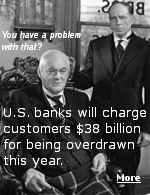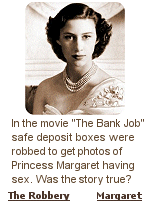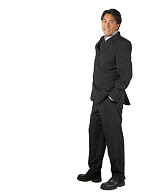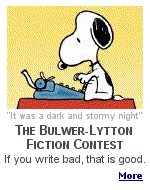 |
| August 12, 2009 |
|
 |
|
Ignoring Clint
Eastwood's advice in "Dirty Harry" that opinions,
like certain body parts, are best kept to yourself.
| U.S. Banks
will earn $38 billion in overdraft fees |

It
is no surprise to many that banks make a lot of money on
overdraft fees, but the news last week that U.S. banks
expect to earn $38 billion this year was a bit of a shocker.
Charging the most to customers who can afford it the least
amounts to about 75% of total bank fee income, as banks
struggle to cover lending losses by passing the cost on to
low-balance depositors.
When I started working at a
bank in 1959, the standard charge for being short in your
account was about 50¢, and that was the total for the
day regardless of how many checks were involved . Fifty
years later, banks routinely $30 or more per check, with no
limit. I've heard the horror stories from my kids about
being charged $70 by the bank for paying a couple of $10 or
$20 checks, and it has happened to me.
Where is the
outrage from Washington or the State Capitol? You won't find
any, the banks have paid a lot of money to keep doing
business as usual. OpenSecrets.org keeps track of political
contributions, and shows commercial banks to be major
contributors to politicians on both the national and state
levels. Check some of their statistics
here.
In addition, most or all state banking associations have "BankPac"
organizations, extracting money from bank officers for
contribution to state and local elections. Years ago, I got
a phone call from the company that owned our bank, saying
they hadn't received my personal check for the BankPac, with
a reminder that "these things are taken into
consideration at your next salary review". Not
responding well to threats, I didn't send it.
To
keep everybody happy, except low-balance bank customers,
politicians periodically go after some other area of bank
services that only affect a small percentage of customers,
where not much money is involved. For example, shortly
before Paul Wellstone (D-MN) died in a tragic plane crash,
he was on the news for several days complaining about the
high cost of using ATM machines, and how those $2 fees were
outrageous, and he was going to do something about it. Who
was complaining? Having spent 35 years in the banking
business, I can tell you it was probably higher-balance
depositors who were never being charged for anything in a
bank. Sure, they could easily afford the $2 bucks, but it
just ticked them off, and it was a good way for politicians
to avoid the real issues.
Banks have gotten more
creative in recent years about how those charges are
assessed. The practice was always to pay all the checks you
could with the funds available in the account, to avoid
abusing the customer unnecessarily. For example, if the
depositor had $100 in his account, and four checks came in,
say for $50, $20, $25, and $40, the bank would pay the three
smallest checks first, leaving $15 in the account to cover
the $50 check. The next morning, the customer would find
himself overdrawn $35 plus an overdraft fee of perhaps $5 or
$10.
Fast-forward to the present with that
same depositor with $100 in his account: To increase fee
income, the bank would pay the $50 and $40 checks first,
leaving the customer with $10 to cover both the $25 and $20
checks. The next morning, this customer is also overdrawn
$35, but the fee is now assessed on two short checks instead
of one, and might total $60 or more.
Just how
profitable are overdrawn accounts to a bank? Don't they have
a lot of money at risk? This is an amazing profit center for
a financial institution. I know of a bank that has $100
million in assets, that would be a fairly good-sized
community bank, and they make about $750,000 a year in
overdraft and return check income. On their balance sheet,
overdrafts are carried as an "earning asset", and
the average daily outstanding average of overdrafts on that
line was about $75,000. Think about it this way: if someone
came to you and offered you an opportunity to invest $75,000
in something that would pay you back $750,000 a year, would
you take it?
What needs to be done? If you could be
Senator or Congressman for a day, you could introduce
legislation that would:
- Outlaw the practice of "paying large items first",
or in "check number order", rather than by the
customary "smallest to largest amount" method.
Banks pay the big checks first for one reason only, and
that is to charge you more fees. Any other reason they
give is baloney.
- Require OD fees to not exceed the amount of the check
causing the overdraft. Many banks charge a $35 fee when
the shortage might only be a couple of dollars.
- Have a daily maximum charge, so that some poor sap
doesn't get, for example, a $140 charge for having four
small checks come in the day before payday.
- Require banks that offer overdraft protection
programs to have information about them readily
available. Over the years, since "Checking Plus",
"Ready Reserve", and similar plans were
introduced, banks stopped advertising them, have taken
the brochures out of their lobby, and only keep them in
a desk drawer for their best customers. They would
rather make big money of overdraft fees, instead of
small amounts of interest on personal lines of credit.
- Eliminate the 3:00 PM cut-off for deposits, no longer
needed with modern electronic processing of checks and
deposits. A deposit made today, regardless of the time,
should be credited today. Of course, that would cost the
banks millions or billions in lost revenue.
- Require Quarterly Bank Call Reports to break-out
overdraft and return check income as a line-item, and
let customers know where they can find a copy of that
report online, or request one by mail.
If your bank is open for business on holidays when
other banks, including the Federal Reserve, are closed, ask
yourself why? I worked for a bank that was open on all of
those optional holidays like Presidents Day, Columbus Day,
and Veterans Day. Most of our competitors, and the Federal
Reserve were closed, why weren't we? The loans were still
earning interest, and if nobody is there, the utilities and
other expenses would be much lower. I knew why we were open,
the owner told me, he just couldn't stand the thought of
paying employees for not working, and the loss of overdraft
income on those days amounted to thousands of dollars.
Shop
around for a bank that doesn't gouge you with fees, there
are still some out there. Recently, I drove by a bank in a
Minneapolis suburb that had a big banner hanging on the
building that said "We're the bank with the $15
overdraft charge!" I'll bet they picked-up a lot of
business. Bankers will say "why go after customers who
are going to be overdrawn?" Think about it, they aren't
overdrawn every day, just now and then, and when they need a
car, home or business loan, where are they going to go
first?
Years ago, my dad was president of a small
rural bank owned by a company that had about 100 other
banks. He was constantly getting pressure from the home
office to raise his overdraft fees and engage in some of
these creative schemes to increase income. I remember him
telling me one night at the dinner table, "If I
have to earn money for the bank by doing that, I'm getting
out of the business". It wasn't long after he
retired that the new bank president raised all of the fees
to towering new levels.
Did I miss anything?

Global
Air Aviation Referral Service
I welcome
responses, and will be glad to post them here. Email your
remarks to
ron@global-air.com |
|

|
Most
Recent Editorial
Recent Global
Air Links:










 |


















